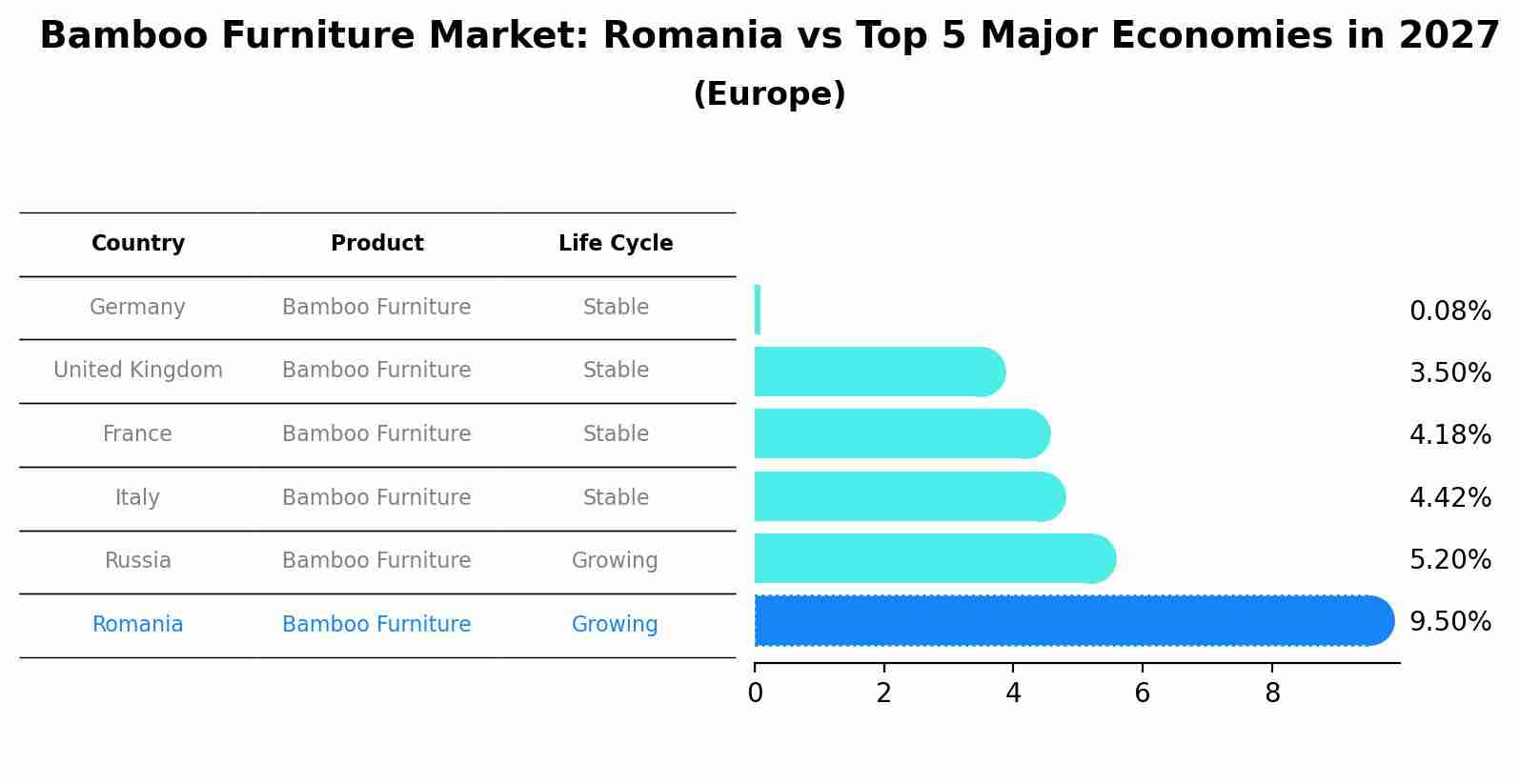Romania Bamboo Furniture Market (2025-2031) Outlook | Analysis, Size, Value, Revenue, Industry, Growth, Forecast, Share, Companies & Trends
| Product Code: ETC370878 | Publication Date: Aug 2022 | Updated Date: Jul 2025 | Product Type: Market Research Report | |
| Publisher: 6Wresearch | Author: Sachin Kumar Rai | No. of Pages: 75 | No. of Figures: 35 | No. of Tables: 20 |
Romania Bamboo Furniture Market Size Growth Rate
The Romania Bamboo Furniture Market is projected to witness mixed growth rate patterns during 2025 to 2029. From 9.29% in 2025, the growth rate steadily ascends to 15.84% in 2029.

Bamboo Furniture Market: Romania vs Top 5 Major Economies in 2027 (Europe)
In the Europe region, the Bamboo Furniture market in Romania is projected to expand at a growing growth rate of 9.50% by 2027. The largest economy is Germany, followed by United Kingdom, France, Italy and Russia.

Romania Bamboo Furniture Market Synopsis
The Romania Bamboo Furniture Market is experiencing steady growth due to increasing consumer awareness of sustainability and eco-friendly products. Bamboo furniture is gaining popularity in Romania as it is a renewable resource, environmentally friendly, and known for its durability and aesthetic appeal. The market is driven by the rising trend of incorporating natural elements into interior design and the growing demand for sustainable furniture options. Key players in the market are focusing on innovation and product development to cater to the evolving consumer preferences. Additionally, the government`s initiatives to promote sustainable practices and the increasing disposable income of the population are contributing to the expansion of the bamboo furniture market in Romania.
Romania Bamboo Furniture Market Trends
In Romania, the Bamboo Furniture Market is experiencing a surge in popularity due to increasing awareness of sustainability and eco-friendly practices among consumers. The demand for bamboo furniture is driven by its reputation as a renewable resource that is both durable and aesthetically pleasing. Consumers are also attracted to the natural and minimalist design elements of bamboo furniture, which align with current interior design trends favoring organic materials and a clean, modern look. Additionally, the affordability of bamboo furniture compared to traditional wood options is appealing to budget-conscious consumers. As a result, manufacturers and retailers in Romania are expanding their offerings of bamboo furniture to meet the growing demand in the market.
Romania Bamboo Furniture Market Challenges
In the Romania Bamboo Furniture Market, some challenges that are faced include limited consumer awareness and understanding of the benefits of bamboo furniture compared to traditional materials, such as wood or metal. Additionally, there may be concerns about the durability and quality of bamboo furniture products, as well as the availability of a wide range of designs and styles to cater to varying consumer preferences. Furthermore, the market may also face obstacles related to the sourcing of high-quality bamboo materials, production processes, and distribution channels. Overcoming these challenges would require educating consumers about the sustainability and eco-friendliness of bamboo furniture, improving product quality and design options, as well as establishing reliable supply chains and marketing strategies to promote the adoption of bamboo furniture in Romania.
Romania Bamboo Furniture Market Investment Opportunities
The Romania Bamboo Furniture Market presents promising investment opportunities due to growing consumer interest in sustainable and eco-friendly products. Bamboo furniture is gaining popularity in the country as it is a renewable resource known for its durability, strength, and aesthetic appeal. Investors can capitalize on this trend by investing in bamboo furniture manufacturing companies, retail outlets specializing in eco-friendly furniture, or by importing and distributing bamboo furniture from international suppliers. Additionally, there is a potential for customization and innovation in the market, allowing investors to differentiate their offerings and cater to niche segments. With increasing awareness about environmental sustainability and a shift towards eco-conscious consumer behavior, the Romania Bamboo Furniture Market holds significant potential for growth and profitability.
Jordan Agar Market Government Policies
The Romanian government has implemented policies aimed at promoting sustainable practices in the bamboo furniture market. These policies include providing subsidies and incentives for businesses that use bamboo as a raw material, in order to encourage the production of eco-friendly furniture. Additionally, there are regulations in place to ensure that bamboo harvesting and processing are done in an environmentally responsible manner to protect the local ecosystem. The government also supports research and development efforts in the bamboo furniture industry to enhance innovation and competitiveness. Overall, these policies reflect a commitment to fostering a thriving and sustainable bamboo furniture market in Romania while promoting environmental conservation and economic growth.
Romania Bamboo Furniture Market Future Outlook
The Romania Bamboo Furniture Market is expected to witness significant growth in the coming years due to increasing awareness about sustainable and eco-friendly furniture options. Consumers are increasingly seeking environmentally friendly alternatives, and bamboo furniture fits this trend perfectly. Additionally, the durability, versatility, and aesthetic appeal of bamboo furniture make it an attractive choice for modern households. The growing focus on sustainable living practices and the rising disposable income levels in Romania are likely to drive the demand for bamboo furniture further. As a result, the market is projected to expand, with more players entering the segment and offering innovative designs and products to cater to the evolving consumer preferences in the country.
Key Highlights of the Report:
- Romania Bamboo Furniture Market Outlook
- Market Size of Romania Bamboo Furniture Market, 2024
- Forecast of Romania Bamboo Furniture Market, 2031
- Historical Data and Forecast of Romania Bamboo Furniture Revenues & Volume for the Period 2021 - 2031
- Romania Bamboo Furniture Market Trend Evolution
- Romania Bamboo Furniture Market Drivers and Challenges
- Romania Bamboo Furniture Price Trends
- Romania Bamboo Furniture Porter's Five Forces
- Romania Bamboo Furniture Industry Life Cycle
- Historical Data and Forecast of Romania Bamboo Furniture Market Revenues & Volume By Type for the Period 2021 - 2031
- Historical Data and Forecast of Romania Bamboo Furniture Market Revenues & Volume By Chairs & Tables for the Period 2021 - 2031
- Historical Data and Forecast of Romania Bamboo Furniture Market Revenues & Volume By Stools for the Period 2021 - 2031
- Historical Data and Forecast of Romania Bamboo Furniture Market Revenues & Volume By Beds for the Period 2021 - 2031
- Historical Data and Forecast of Romania Bamboo Furniture Market Revenues & Volume By Others for the Period 2021 - 2031
- Historical Data and Forecast of Romania Bamboo Furniture Market Revenues & Volume By End User for the Period 2021 - 2031
- Historical Data and Forecast of Romania Bamboo Furniture Market Revenues & Volume By Residential for the Period 2021 - 2031
- Historical Data and Forecast of Romania Bamboo Furniture Market Revenues & Volume By Commercial for the Period 2021 - 2031
- Romania Bamboo Furniture Import Export Trade Statistics
- Market Opportunity Assessment By Type
- Market Opportunity Assessment By End User
- Romania Bamboo Furniture Top Companies Market Share
- Romania Bamboo Furniture Competitive Benchmarking By Technical and Operational Parameters
- Romania Bamboo Furniture Company Profiles
- Romania Bamboo Furniture Key Strategic Recommendations
Frequently Asked Questions About the Market Study (FAQs):
- Single User License$ 1,995
- Department License$ 2,400
- Site License$ 3,120
- Global License$ 3,795
Search
Related Reports
- ASEAN and Thailand Brain Health Supplements Market (2025-2031) | Strategy, Consumer Insights, Analysis, Investment Trends, Opportunities, Growth, Size, Share, Industry, Revenue, Segments, Value, Segmentation, Supply, Forecast, Restraints, Outlook, Competition, Drivers, Trends, Demand, Pricing Analysis, Competitive, Strategic Insights, Companies, Challenges
- ASEAN Bearings Market (2025-2031) | Strategy, Consumer Insights, Analysis, Investment Trends, Opportunities, Growth, Size, Share, Industry, Revenue, Segments, Value, Segmentation, Supply, Forecast, Restraints, Outlook, Competition, Drivers, Trends, Demand, Pricing Analysis, Competitive, Strategic Insights, Companies, Challenges
- Europe Flooring Market (2025-2031) | Outlook, Share, Industry, Trends, Forecast, Companies, Revenue, Size, Analysis, Growth & Value
- Saudi Arabia Manlift Market (2025-2031) | Outlook, Size, Growth, Trends, Companies, Industry, Revenue, Value, Share, Forecast & Analysis
- Uganda Excavator, Crane, and Wheel Loaders Market (2025-2031) | Strategy, Consumer Insights, Analysis, Investment Trends, Opportunities, Growth, Size, Share, Industry, Revenue, Segments, Value, Segmentation, Supply, Forecast, Restraints, Outlook, Competition, Drivers, Trends, Demand, Pricing Analysis, Competitive, Strategic Insights, Companies, Challenges
- Rwanda Excavator, Crane, and Wheel Loaders Market (2025-2031) | Strategy, Consumer Insights, Analysis, Investment Trends, Opportunities, Growth, Size, Share, Industry, Revenue, Segments, Value, Segmentation, Supply, Forecast, Restraints, Outlook, Competition, Drivers, Trends, Demand, Pricing Analysis, Competitive, Strategic Insights, Companies, Challenges
- Kenya Excavator, Crane, and Wheel Loaders Market (2025-2031) | Strategy, Consumer Insights, Analysis, Investment Trends, Opportunities, Growth, Size, Share, Industry, Revenue, Segments, Value, Segmentation, Supply, Forecast, Restraints, Outlook, Competition, Drivers, Trends, Demand, Pricing Analysis, Competitive, Strategic Insights, Companies, Challenges
- Angola Excavator, Crane, and Wheel Loaders Market (2025-2031) | Strategy, Consumer Insights, Analysis, Investment Trends, Opportunities, Growth, Size, Share, Industry, Revenue, Segments, Value, Segmentation, Supply, Forecast, Restraints, Outlook, Competition, Drivers, Trends, Demand, Pricing Analysis, Competitive, Strategic Insights, Companies, Challenges
- Israel Intelligent Transport System Market (2025-2031) | Strategy, Consumer Insights, Analysis, Investment Trends, Opportunities, Growth, Size, Share, Industry, Revenue, Segments, Value, Segmentation, Supply, Forecast, Restraints, Outlook, Competition, Drivers, Trends, Demand, Pricing Analysis, Competitive, Strategic Insights, Companies, Challenges
- Uganda Precast and Aggregate Market (2025-2031) | Strategy, Consumer Insights, Analysis, Investment Trends, Opportunities, Growth, Size, Share, Industry, Revenue, Segments, Value, Segmentation, Supply, Forecast, Restraints, Outlook, Competition, Drivers, Trends, Demand, Pricing Analysis, Competitive, Strategic Insights, Companies, Challenges
Industry Events and Analyst Meet
Our Clients
Whitepaper
- Middle East & Africa Commercial Security Market Click here to view more.
- Middle East & Africa Fire Safety Systems & Equipment Market Click here to view more.
- GCC Drone Market Click here to view more.
- Middle East Lighting Fixture Market Click here to view more.
- GCC Physical & Perimeter Security Market Click here to view more.
6WResearch In News
- Doha a strategic location for EV manufacturing hub: IPA Qatar
- Demand for luxury TVs surging in the GCC, says Samsung
- Empowering Growth: The Thriving Journey of Bangladesh’s Cable Industry
- Demand for luxury TVs surging in the GCC, says Samsung
- Video call with a traditional healer? Once unthinkable, it’s now common in South Africa
- Intelligent Buildings To Smooth GCC’s Path To Net Zero













